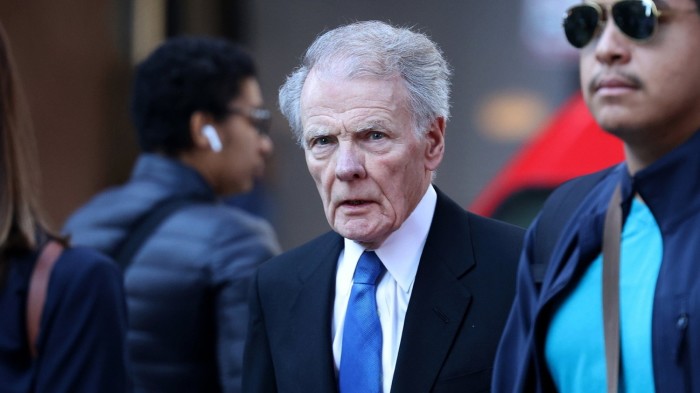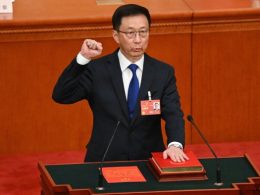The longest-serving legislative leader in US history, dubbed “the Velvet Hammer”, did what no one expected this month at a federal courthouse in Chicago: he took the stand to defend himself in his corruption trial.
Mike Madigan, “a young 82” by his own testimony, told jurors that while people had often come to him for help during his nearly four decades as the powerful speaker of the Illinois House of Representatives he never traded his public office for private gain.
His unexpected testimony was another twist in a trial that has featured tales of Viagra bribes and sex acts in massage parlours — and has gripped a city in which politics has been called a “blood sport”.
Prosecutors have charged the Chicago politician with bribery and racketeering, arguing he built a criminal enterprise to enrich himself and his allies, and increase his political power. He has pleaded not guilty.
The trial, now in its third month and heading towards closing arguments, is the culmination of a sprawling, decade-long corruption investigation that has netted several convictions, including the chief executive of a public utility and a longtime member of Chicago’s city council.
No other American city has racked up more corruption convictions than Chicago over the past four decades. Since 1976 more than 1,800 public officials in Chicago have been convicted on such charges, according to a 2023 report from the political science department at University of Illinois at Chicago. Four of the state’s 10 previous governors have gone to prison.
Corruption cases have occurred so frequently in Chicago that the US attorney’s office in the city is known for its expertise in them, akin to the Southern District of New York’s reputation for tackling Wall Street crime.
“It isn’t a rotten apple in the barrel,” said Dick Simpson, a professor emeritus at University of Illinois at Chicago. “It’s a rotten barrel.”
Madigan’s father was a ward superintendent on the south-west side of the city, an unelected position controlling neighbourhood garbage pick-up and snow removal that was his introduction into the bottom of the city’s political power structure. Madigan worked on the back of a truck, courtesy of his father’s connections, which paved the way for him to meet mayor Richard J Daley, whose tenure in City Hall from 1955 through 1976 epitomised Democratic machine politics.
Daley garnered international fame as he turned Chicago into an electoral stronghold for national Democrats, and in the wake of the 1960 presidential election, Republicans alleged he stuffed ballot boxes to favour John F Kennedy.
Madigan built up the 13th Ward Democratic Organization into a powerful political committee that could deliver votes for party-approved candidates. He was elected to the state legislature in 1971 and became speaker in 1983, a role he would hold for all but two years until 2021. He then became chair of the state Democratic party in 1998.
The former House speaker consolidated legislative and party power. He controlled a well-developed get-out-the-vote operation and could direct campaign funds to favoured candidates. He also could award committee chairs in the legislature, which helped lawmakers raise funds and win re-election.
“Almost everywhere you turn, people are beholden to him, and they are inclined — it’s for their good political health — to do what he wants,” said Tom Gradel, a former political media consultant who co-authored the book Corrupt Illinois with Simpson. “They can’t really buck him and survive.”
As speaker, Madigan controlled all significant legislation that moved in the state capital. During his tenure, Illinois amassed significant unfunded pension liabilities, now at $144bn, which have saddled the state’s finances.
Bruce Rauner, a Republican whose single term in the governor’s office was defined by a public feud with Madigan, said the speaker was the most powerful politician in the state. On the stand, Madigan described their relationship as “toxic”.
Famously private, Madigan was known for eating one apple a day for lunch and for having neither an email address or a cell phone.
The 23-count indictment from 2022 charges Madigan and his longtime ally, Mike McClain, with doing legislative favours for Illinois electric utility Commonwealth Edison in exchange for hiring the former speaker’s political associates for jobs where they did little work. The “ComEd Four”, including the utility’s former chief executive, were convicted in 2023 on bribery-related charges.
Madigan is also charged with illegally trying to win business for his private law firm from property developers.
Prosecutors’ star witness is Danny Solis, a longtime city council member who became an FBI mole to avoid prison for his own misdeeds. Solis, the head of the council’s zoning committee, testified a developer offered him free Viagra and sessions at massage parlours that included sex acts in return for favourable treatment.
Solis began wearing a wire while still on the council. The recordings have been a key part of the case against Madigan. In one, Solis tells Madigan a developer understood “the quid pro quo” of hiring Madigan’s law firm to obtain zoning changes. On the stand, Madigan said he reacted with “a great deal of surprise and concern” and later met again with Solis, telling him he “shouldn’t be talking like that”.
“We all have regrets in life,” he testified later. “One of my regrets is that I had any time spent with Danny Solis.”
The trial’s final drama could be over what instructions are given to the jury. The Supreme Court’s game-changing decision last year in Snyder vs United States has legalised “gratuities”, defined as rewards doled out after an official action. So prosecutors must prove Madigan was bribed to later carry out actions, essentially narrowing the lane for prosecutors to prove their case.
The judge in the case, John Robert Blakey, said he does not think the Supreme Court decision applies in Madigan’s case. But the ComEd Four have applied for new trials, or a directed verdict of not guilty, based on the ruling.
Politics in Illinois have changed, and there are fewer opportunities for a politician to amass the kind of power Madigan did. Still, Grabel noted that when Harold Washington became the first black mayor of Chicago in 1983 and declared the machine “dead, dead, dead”, the obituary was premature.
“It was in intensive care,” he said. “But it wasn’t dead.”
Source link









